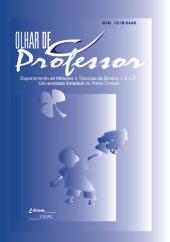AS PRÁTICAS PEDAGÓGICAS DE LEITURA NA FORMAÇÃO DO PROFESSOR
Main Article Content
Abstract
Este texto refere-se a uma pesquisa desenvolvida em duas escolas da rede estadual de ensino das cidades de Matinhos (PR) e Pontal do Paraná (PR), envolvendo professores de Língua Portuguesa, Ciências e História das séries finais do Ensino Fundamental. O estudo investigou o papel formativo das práticas pedagógicas de leitura, exercidas por professores dessas disciplinas, sobre suas próprias formações. Trabalhamos com o mundo da leitura, com as experiências profissionais e os saberes dos professores. Consideramos que por meio das práticas pedagógicas de leitura, os professores também produzem, mobilizam e ressignificam saberes que se voltam para sua formação. Assim, assumimos uma atitude de reconhecimento da relevância do contexto das práticas para a formação continuada docente. Pelo método da Análise de Conteúdo, encontramos as categorias leitura, aluno, livro didático e tempo, que foram discutidas a fim de responder à questão norteadora da investigação. Constatamos, então, que as práticas pedagógicas de leitura são formativas e que, tanto a leitura, os alunos e os livros didáticos quanto o tempo, promovem a formação continuada dos professores,à medida que contribuem para a (re) construção de seu saber eseu fazer.
Downloads
Article Details
Authors who publish in this journal agree with the following terms:
a) Authors keep the copyrights and concede the right of its first publication to the magazine. The work piece must be simultaneously licensed on the Creative Commons Attribution License which allows the paper sharing, and preserves both the author identity and the right of first publication to this magazine.
b) Authors are authorized to assume additional contracts separately, to not-exclusively distribution of the paper version published in this magazine (e.g.: publish in institutional repository or as a book chapter), with the author identity recognition and its first publication in this magazine.
c) Authors are permitted and stimulated to publish and distribute their papers online (e.g.: in institutional repository or on their personal webpage), considering it can generate productive alterations, as well as increase the impact and the quotations of the published paper.
d) This journal provides public access to all its content, as this allows a greater visibility and reach of published articles and reviews. For more information on this approach, visit the Public Knowledge Project, a project that developed this system to improve the academic and public quality of the research, distributing OJS as well as other software to support the publication system of public access to academic sources.
e) The names and e-mail addresses on this site will be used exclusively for the purposes of the journal and are not available for other purposes.

This work is licensed under a Creative Commons Attribution 4.0 International License.

